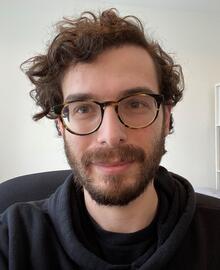
'It's saving lives'
Waterloo Engineering alumnus helps build online initiative to get more Canadians vaccinated

Waterloo Engineering alumnus helps build online initiative to get more Canadians vaccinated
By Brian Caldwell Faculty of EngineeringJosh Kalpin started out just trying to protect his own friends and family from COVID-19.
A month later, the Waterloo Engineering alumnus has helped thousands of people across the country get shots in the arm as a core volunteer for a Twitter account that spreads the word on available vaccine appointments.
Vaccine Hunters Canada has grown to more than 140,000 followers and is now partnering directly with some health agencies to help people find open slots and boost vaccine uptake by matching demand with supply.

Josh Kalpin graduated from the software engineering program at the University of Waterloo in 2016.
Kalpin (BSE ’16), a software engineer in Toronto for financial technology company Square, had no idea how the service would take off when he offered to help after coming across it in his own search for vaccine appointments.
Now it’s “like a second full-time job” and he has done interviews with reporters across the country to promote the account and help ensure available vaccine slots don’t go unfilled.
“We’re saving lives – and a lot of them,” Kalpin says. “I think that summarizes the impact pretty well.”
A team of almost 50 volunteers at Vaccine Hunters Canada scours pharmacy, hospital and clinic sites for updates on vaccine appointments, then announces them on the Twitter account and a Discord chat server.
The result is a tool that helps users navigate what can be a confusing system to secure approved vaccine appointments, kind of an online clearinghouse to improve booking efficiency and make sure available doses are put to good use.
“Shots in arms,” says Kalpin, who turned an engineering co-op position into his full-time job at Square. “That’s the goal.”
As the second person in on the initiative, he credits lessons learned at the University of Waterloo on “how to get things done” for the skills he needed to manage such a rapid scale-up.
It has been a busy but rewarding experience for Kalpin, a former executive with the Engineering Society at Waterloo who came home to make a difference after working stints in San Francisco and New York.
“This has given me and a lot of other Canadians something tangible to do in a year that we’ve all felt very helpless,” he says. “I think that is a powerful thing.”
Main photo: Gustavo Fring from Pexels

Read more
Waterloo co-op student applies engineering and tech skills at Caivan to support purpose-built housing and build land-development expertise

Read more
How Doug Kavanagh’s software engineering degree laid the foundation for a thriving career in patient care

Read more
Upside Robotics secures new funding to accelerate the future of sustainable farming
The University of Waterloo acknowledges that much of our work takes place on the traditional territory of the Neutral, Anishinaabeg, and Haudenosaunee peoples. Our main campus is situated on the Haldimand Tract, the land granted to the Six Nations that includes six miles on each side of the Grand River. Our active work toward reconciliation takes place across our campuses through research, learning, teaching, and community building, and is co-ordinated within the Office of Indigenous Relations.